Of course when I first got Candy, I had no idea what I could and could not give here. My mom and I did a lot of research and we came down with a compiled list. Hopefully, this will help someone who is in need of guidance. I am not an expert on "How to Raise a Puppy," but I can tell you that I truly love learning new things about caring for my puppy and finding new ways of making her healthy.
I'm sure all of you puppy-manias have dealt with this situation before: You're eating a meal or snack, and out of the corner of your eye, you see your puppy or dog sitting there staring at you, wagging their tail. You also see their eyes moving in each direction your hand moves. You tell yourself to resist to urge to look over, but you give in and slow turn your head and BAM! Your eyes meet. Game over. "Okay, come here, I'll give you a piece."
If you're laughing and know that this happens to you way too often, at least know what food dogs are allowed and not allowed to have. Let's begin :)
Not Allowed:
2. Alcohol: This, I hope, is a given. Alcohol has the same effect on a dog's liver and brain as it has on humans. However, a little can do more damage for dogs (especially for smaller dogs). Some signs and symptoms (S/S) can be vomiting, diarrhea, central nervous system depression, problems with coordination, difficult breathing, coma, and even death.
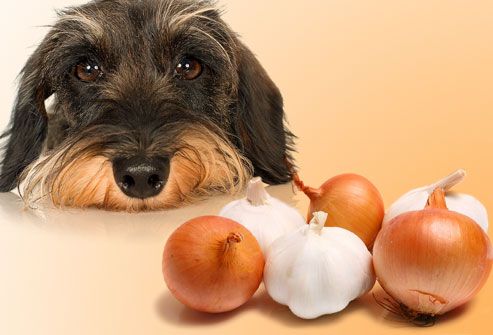 3. Onions and Garlic: Any form of onion and garlic (powdered, raw, cooked, or dehydrated) will damage and destroy a dog's red blood cells, which will lead to anemia. An occasional small dose is probably okay, but eating large quantities at once will definitely be harmful. S/S of anemia include weakness, vomiting, little interest in food, dullness, and breathlessness. (A human side note: Garlic can be used as a blood-thinning substance for humans, but do not have it anywhere near your dogs!)
3. Onions and Garlic: Any form of onion and garlic (powdered, raw, cooked, or dehydrated) will damage and destroy a dog's red blood cells, which will lead to anemia. An occasional small dose is probably okay, but eating large quantities at once will definitely be harmful. S/S of anemia include weakness, vomiting, little interest in food, dullness, and breathlessness. (A human side note: Garlic can be used as a blood-thinning substance for humans, but do not have it anywhere near your dogs!) 4. Coffee, Tea, or Other Caffeine: Caffeine can be fatal to your dog and there is no antidote to cure it. S/S include restlessness, rapid breathing, heart palpitations, muscle tremors, fits, and bleeding. Common foods that contain caffeine are cocoa, chocolate, colas, energy drinks, cold medicine, or pain killers.
4. Coffee, Tea, or Other Caffeine: Caffeine can be fatal to your dog and there is no antidote to cure it. S/S include restlessness, rapid breathing, heart palpitations, muscle tremors, fits, and bleeding. Common foods that contain caffeine are cocoa, chocolate, colas, energy drinks, cold medicine, or pain killers.5. Grapes and Raisins: Grapes and raisins can cause kidney failure in dogs. A small amount can make a dog severely sick. Repeated vomiting is an early sign. Within a day, the dog will become lethargic and depressed. So make sure you don't leave it on top of your table tops or anywhere your dog may be able to reach it.
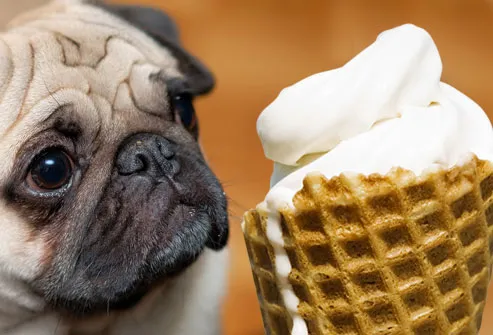 6. Milk and Dairy Products: In the first couple months of life, puppies drink breast milk, so why is it not okay to give milk now? Well, milk and dairy products cause diarrhea and upset stomach. It can also become a trigger to other food allergies, which is manifested through itching.
6. Milk and Dairy Products: In the first couple months of life, puppies drink breast milk, so why is it not okay to give milk now? Well, milk and dairy products cause diarrhea and upset stomach. It can also become a trigger to other food allergies, which is manifested through itching.7. Macadamia Nuts: Once again, a little can do a lot of your little ones. S/S include muscle tremors, weakness or paralysis of hindquarters, vomiting, elevated body temperature, and rapid heart rate.
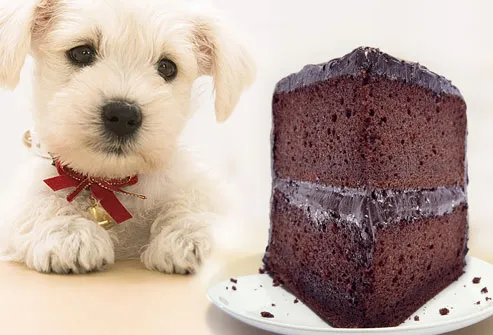 8. Candy, Gum and Sweets: Another obvious? Here's the reason why: Xylitol, which is used as a sweetener, causes an increase of insulin in your dog's bloodstream, which in return, decreases the blood glucose levels. Early S/S are vomiting, lethargy, and loss of coordination. However, late S/S include seizures or even liver failure. Sugary food can also lead to obesity, dental problems and even diabetes.
8. Candy, Gum and Sweets: Another obvious? Here's the reason why: Xylitol, which is used as a sweetener, causes an increase of insulin in your dog's bloodstream, which in return, decreases the blood glucose levels. Early S/S are vomiting, lethargy, and loss of coordination. However, late S/S include seizures or even liver failure. Sugary food can also lead to obesity, dental problems and even diabetes.9. Fat trimmings and Bones: No, this is a big no-no. Fats (either cooked or uncooked) can cause pancreatitis (inflammation of your pancreas) in your dog. It may also seem normal to give a dog a bone, but dogs can choke on it, or sharp ends of bones can cause an obstruction of laceration in your dog's stomach or intestine. I have definitely have a couple incidents where Candy found her way into the leftovers. This may not be the most decisive solution, but if your dog poos, you're good!
10. Persimmons, Peaches, and Plums: The actual fruit isn't the problem, it's those SEEDS! They can cause an inflammation of the small intestine, or an obstruction. Peach and plum seeds contain cyanide, which is poisonous to both humans and dogs!
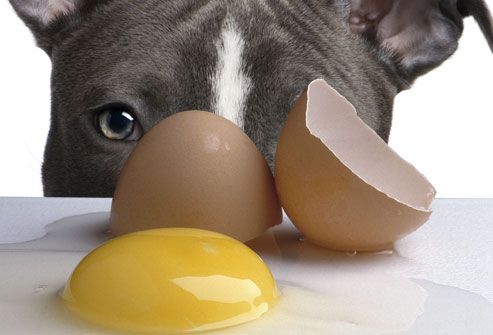
11. Raw Eggs: First off, raw eggs may cause food poisoning from Salmonella or E. coli. Second, raw eggs have an enzyme that prevent dogs from absorbing vitamin B, which will cause skin problems in your dog. Candy LOVES eggs. What I usually do is cook an egg with coconut oil and give her little pieces once in a while. Any other dogs go crazy for eggs?
12. Raw Meat and Fish: It will cause food poisoning, and if not treated, it will be fatal in two weeks. First signs of illness are vomiting, fever, and big lymph nodes. Make sure to cook meat and fish thoroughly and make sure to remove the bones!
13. Salt: Dogs don't sweat, so if your dog eats a lot of salt, this can't be good. S/S of sodium ion poisoning include vomiting, diarrhea, depression, tremors, elevated body temperatures, seizures, or even death.
14. Yeast Dough: When you put the dough in the oven, it rises, right? Well, that's exactly what it will do in your dog's stomach. It will cause a lot of pain. Also, the alcohol in the dough can cause poisoning.
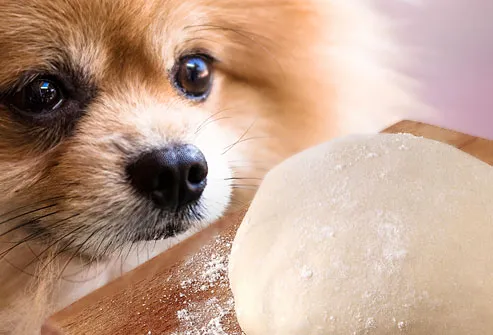
Lastly, do not share you medicine, such as Tylenol or Motrin, with your dog. Also, baking powder/soda, nutmeg, and other spices are very toxic to dogs, so make sure they are out of your dog's reach. Just in case your dog ingests something he/she weren't suppose to, it's always safe to have the number of your local vet, the closest emergency clinic, and the ASPCA Animal Poison Control Center (888) 426-4435.
ALLOWED:
After that extensive list of NOs, what is allowed, right? Well, in my opinion, you should not replace dog food with human food. Dog food usually contain most of the nutrients and vitamins that dogs need, so it is not necessary to provide a variety of boosts and supplements with human food. However, it is definitely okay to give dogs some types of human food and here is the short and simple list.
1. Lean meats: Make sure you remove visible fat and all the bones. And of course, make sure to cook thoroughly.
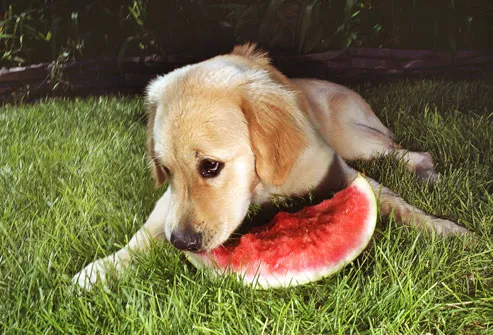 2. Fruits and Vegetables: Fruits that dogs are allowed to eat are apples, oranges, bananas, and watermelon. Make sure the seeds are removed. Vegetables that dogs are allowed to eat are carrot sticks, green beans, cucumber and zucchini slices, and even plain baked potato. Make sure you don't give you dog raw potato or potato that are beginning to bloom because it is poisonous.
2. Fruits and Vegetables: Fruits that dogs are allowed to eat are apples, oranges, bananas, and watermelon. Make sure the seeds are removed. Vegetables that dogs are allowed to eat are carrot sticks, green beans, cucumber and zucchini slices, and even plain baked potato. Make sure you don't give you dog raw potato or potato that are beginning to bloom because it is poisonous.3. White Rice and Pasta: Lastly, white rice and pasta can be okay after it is cooked. Sometimes, white rice with boiled chicken can relieve stomach upset for dogs.
I know this was a very long post; however, I hope that this was a good introduction to the "Puppy 101" series. Specific details from the list were found on WebMd. Thank you for reading this lengthy post :)






